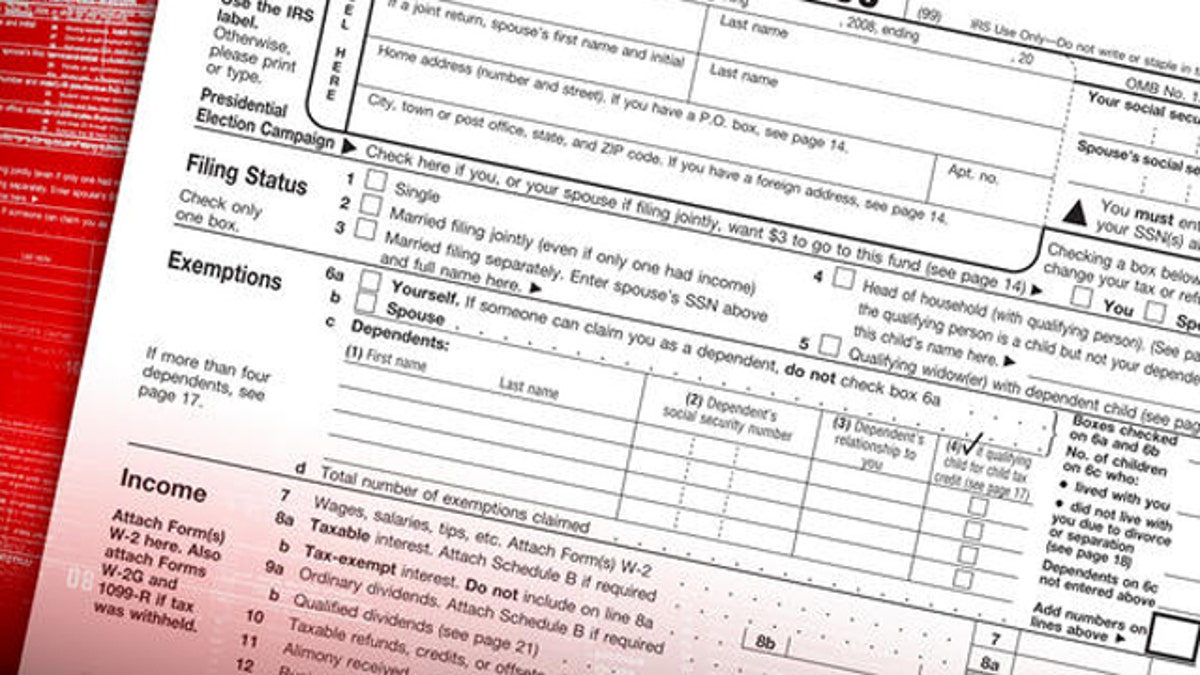
A 1040 IRS income tax form. (AP)
Setting tax rates is always a tricky political proposition, but with the economy stalled and government debts continuing to mount, Congress is embroiled in a brutal battle over federal taxes.
While conservatives demand low rates to encourage growth, liberals say that it is time for upper income earners to start paying more in order to finance stimulus spending and debt reduction. Many on both sides say the time has come to simplify the tax code.
And as Republicans and Democrats wrangle over President Obama's requested increase to the government's $14.3 trillion borrowing limit, everything is on the table. The result of the current tax debate could determine the trajectory of the currently weak recovery.
"In the short run, if we were to lower taxes, that would provide some stimulus to demand, it would put more money in people's pockets and give them more money to spend," economist Martin Bailey of the liberal Brookings Institution told Fox News. "We have these huge budget deficits. So while on the one hand you might be contributing positively to demand, on the other hand, you're contributing more to this problem or as much to this problem of the big deficit. "
In contrast, Veronique de Rugy of the conservative Mercatus Center at George Mason University argues that higher taxes and a redistributive approach is counter-productive.
"Government cannot create wealth," de Rugy said. "We've come out of three years where a government has told us that by spending massive amounts, it could actually create jobs, enhance, and create wealth, and we've seen that it hasn't worked."
History is full of examples that support both views. The Reagan years saw tax cuts and a growing economy. The Clinton years saw tax hikes and a growing economy.
But most economists are careful not to confuse correlation with causation. The economy, in sum, is the culmination of literally trillions of exchanges of goods, services and transactions occurring every day. Economists say no one person, no president, and no economist can predict with certainty what changes tax policy may cause. Predictions, they say, are frequently wrong.
Indeed, economist Mark Robyn of the non-partisan Tax Foundation admits, "The science of economics is looking at unintended consequences."
If that is the case, one cautionary tale about raising taxes, especially on one targeted segment of the population, comes from the early 1990's.
In 1990, Congress passed a tax on luxury goods. It was seen as a way to raise revenue by targeting those people who could most afford it. But as a result of the tax on luxury goods, by 1991, car importers like BMW and Mercedes lost 20 percent of market share in the U.S. And the pleasure boat industry laid-off 19,000 craftsmen, carpenters and other blue-collar workers. It was, as common sense would dictate, the less wealthy who ended up paying the ultimate price for wealthy citizens decision not to spend as freely as they might otherwise have.
Taxing the wealthy is on the table once again. Obama has made the case for it many times, including at a major address at George Washington University on April 14th of this year.
"In the last decade, the average income of the bottom 90 percent of all working Americans actually declined," he said. "The top 1 percent saw their income rise by an average of more than a quarter of a million dollars each. And that's who needs to pay less taxes?"
What the president did not say in that address was that while the wealthy may be getting more so, they're also shouldering a larger share of the tax burden.
According to the IRS, the top 1 percent of income earners paid 38 percent of all federal income taxes in 2008, while the bottom half paid only 3 percent. Forty-nine percent of U.S. households paid no federal income tax at all.
This is the latest piece in Fox News' series "10 Ways to Save the Economy."
Click here for more Road to Recovery stories from Foxnews.com.

